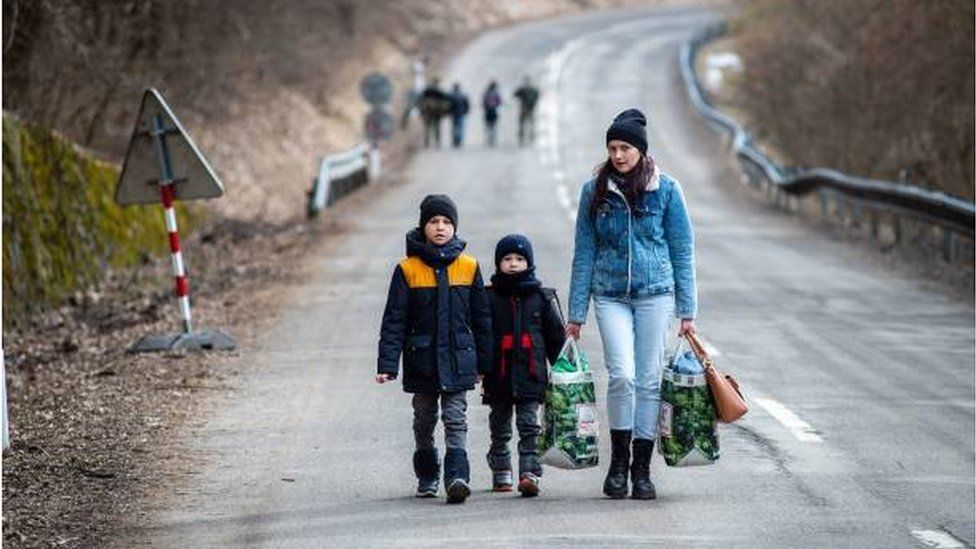Major UK businesses are lining up to offer jobs to Ukrainian refugees when they start to arrive in the UK.
A group of more than 45 large businesses is pressing the government to make it easier for those driven out by Russia’s invasion to come to the UK.
Marks & Spencer, Asos, Lush and recruitment giant Robert Walters are some of the firms involved.
The government has been criticised over the speed and scale of its response to the Ukraine refugee crisis.
The initiative is being led by British entrepreneur Emma Sinclair, the chief executive of Enterprise Alumni. She said it had quickly gained ground in a short space of time.
The project is in its early stages, and many of the details about how it will work in practice are unclear.
Ms Sinclair, who is co-ordinating the initiative at the moment despite a recent head injury, told the BBC that many of her ancestors were from Eastern Europe, including Ukraine.
The aim of the project is to help “tens of thousands” of refugees not only get jobs in the UK, but to help them find accommodation, and gain language skills.
‘Want to help’
Many UK businesses have been facing labour shortages due to a combination of factors including Covid and Brexit, and it is in their interests to fill outstanding vacancies.
However, Ms Sinclair said the consortium was “purely altruistic” and not acting to promote any particular corporate agenda.
The companies involved, especially the recruitment firms, have got “thousands of jobs to fill every day of the week” – this is not a new situation for them, she said.
“People are inherently generally good, and people want to help,” she added.
The initiative, which was first reported in the Sunday Times, wants to provide tens of thousands of jobs.
Ms Sinclair is due to have a meeting with the newly appointed Minister for Refugees Richard Harrington on Monday, and she has also been in contact with Number 10 Downing Street.
“We [businesses] want people, we need people, and we want to help,” she said. “We want to see movement on rising numbers of refugees.”
She said the current focus of this initiative is to help refugees from Ukraine rebuild their lives, but in an ideal world the scheme would be extended to all refugees.
The government has been criticised, including by its own MPs, for not moving quickly enough to help refugees from Ukraine.
Ms Sinclair said that the UK “can do better” and “go faster” than it is currently on Ukraine refugees.
“We want to see the red tape burnt,” she said.
A government spokesperson said: “We are standing shoulder to shoulder with Ukrainians which is why we’ve made it easier for those with valid Ukrainian passports to come here. This is alongside changes to visas to ensure Ukrainians in the UK can stay here.
“We have expanded our visa application capacity to 13,000 a week, deployed additional staff across the EU, with a 24/7 helpline in place to ensure those who need appointments can get them to come here.
“This allows us to balance security risks while welcoming those in need,” they added.
Firms signed up
Marks & Spencer, which is part of the consortium, said it was “absolutely committed to supporting Ukrainian refugees” both through humanitarian schemes and through jobs.
“We are in discussion with the Home Office about the detail of this,” it said.
Online fashion retailer Asos, which is also involved in the initiative, said: “We are currently recruiting for many tech engineering roles in the UK and we know Ukraine has a strong skill set in this area.
“We are also working with our partners to explore opportunities at our distribution centres in the UK and elsewhere in Europe.”
Asos expects the number of positions to be in double digits in the UK, adding the business already has a Ukrainian workforce in Poland so opportunities for newly arrived refugees will exist there.
High street cosmetics business Lush said it was “happy to consider refugees for any role, even those we would usually advertise for internal candidates only”.
It said its recruiters are meeting with the Refugee Council charity next week to “share what potential opportunities there are across the business”.
Lush added that it was recruiting web developers and other tech roles, designers, spa therapists and warehouse and retail assistants – and from May and June, temporary staff for the Christmas period.
Toby Fowlston, chief executive of recruitment giant Robert Walters, said the firm had “committed to hiring displaced Ukrainians into our own business and as a recruitment company we will also represent them as potential employees to our clients”.
“We will need government support to help expedite working visas to ensure we can act quickly.”,” he added.
Another large UK recruitment firm Impellam Group is part of the consortium, as is software company Unit4 and Portman Dental Group.
Sara Nathan, co-founder of Refugees at Home, said the charity is ready to help the consortium place refugees in accommodation.
However, she warned that for a six-month placement, both the refugees and the people offering space in their houses need to be screened, otherwise it “might be a little dangerous”.
Ms Nathan added that the processes for dealing with Ukrainian refugees also needed to be fair to refugees of other nationalities.
“What happens to Afghans?” she said. “They are still in hotels.”
Organisations that are not linked to the initiative have also contacted the Home Office to say they are willing to offer refugees jobs, include Tesco, Sainsbury’s, Morrisons and the Co-op.
Displaced
More than 2.5 million people have fled Ukraine since Russia’s invasion, and European Union countries have let them come in without a visa for three years.
In the UK, at the moment only Ukrainian refugees with family connections in the UK can apply for a visa under the Ukraine Family Scheme. Other visas are available but application centres in Ukraine are closed.
However, under a new scheme called Homes for Ukraine, people will be able to nominate a named individual or a family to stay with them rent-free, or in another property, for at least six months.
Sponsors will not be required to know the refugees in advance and there will be no limit on the number of people who can come to the UK through this route.
Refugees will be given three years leave to remain, with the right to work and access public services.
To view the original article, click here.




